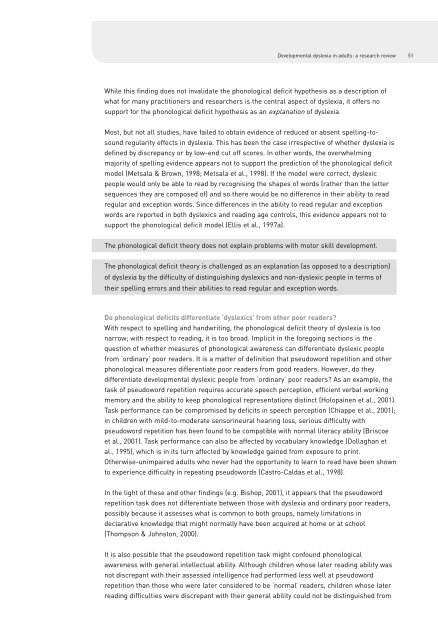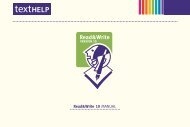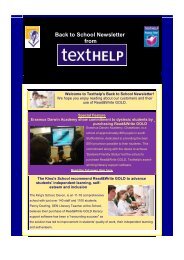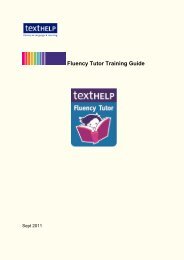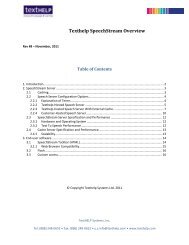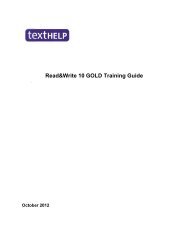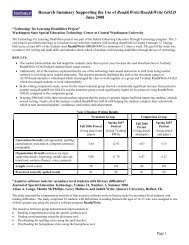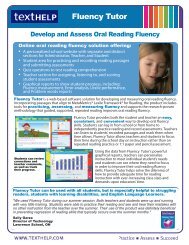01 NRDC Dyslexia 1-88 update - Texthelp
01 NRDC Dyslexia 1-88 update - Texthelp
01 NRDC Dyslexia 1-88 update - Texthelp
You also want an ePaper? Increase the reach of your titles
YUMPU automatically turns print PDFs into web optimized ePapers that Google loves.
Developmental dyslexia in adults: a research review 51<br />
While this finding does not invalidate the phonological deficit hypothesis as a description of<br />
what for many practitioners and researchers is the central aspect of dyslexia, it offers no<br />
support for the phonological deficit hypothesis as an explanation of dyslexia.<br />
Most, but not all studies, have failed to obtain evidence of reduced or absent spelling-tosound<br />
regularity effects in dyslexia. This has been the case irrespective of whether dyslexia is<br />
defined by discrepancy or by low-end cut off scores. In other words, the overwhelming<br />
majority of spelling evidence appears not to support the prediction of the phonological deficit<br />
model (Metsala & Brown, 1998; Metsala et al., 1998). If the model were correct, dyslexic<br />
people would only be able to read by recognising the shapes of words (rather than the letter<br />
sequences they are composed of) and so there would be no difference in their ability to read<br />
regular and exception words. Since differences in the ability to read regular and exception<br />
words are reported in both dyslexics and reading age controls, this evidence appears not to<br />
support the phonological deficit model (Ellis et al., 1997a).<br />
The phonological deficit theory does not explain problems with motor skill development.<br />
The phonological deficit theory is challenged as an explanation (as opposed to a description)<br />
of dyslexia by the difficulty of distinguishing dyslexics and non-dyslexic people in terms of<br />
their spelling errors and their abilities to read regular and exception words.<br />
Do phonological deficits differentiate ‘dyslexics’ from other poor readers?<br />
With respect to spelling and handwriting, the phonological deficit theory of dyslexia is too<br />
narrow; with respect to reading, it is too broad. Implicit in the foregoing sections is the<br />
question of whether measures of phonological awareness can differentiate dyslexic people<br />
from ‘ordinary’ poor readers. It is a matter of definition that pseudoword repetition and other<br />
phonological measures differentiate poor readers from good readers. However, do they<br />
differentiate developmental dyslexic people from ‘ordinary’ poor readers? As an example, the<br />
task of pseudoword repetition requires accurate speech perception, efficient verbal working<br />
memory and the ability to keep phonological representations distinct (Holopainen et al., 20<strong>01</strong>).<br />
Task performance can be compromised by deficits in speech perception (Chiappe et al., 20<strong>01</strong>);<br />
in children with mild-to-moderate sensorineural hearing loss, serious difficulty with<br />
pseudoword repetition has been found to be compatible with normal literacy ability (Briscoe<br />
et al., 20<strong>01</strong>). Task performance can also be affected by vocabulary knowledge (Dollaghan et<br />
al., 1995), which is in its turn affected by knowledge gained from exposure to print.<br />
Otherwise-unimpaired adults who never had the opportunity to learn to read have been shown<br />
to experience difficulty in repeating pseudowords (Castro-Caldas et al., 1998).<br />
In the light of these and other findings (e.g. Bishop, 20<strong>01</strong>), it appears that the pseudoword<br />
repetition task does not differentiate between those with dyslexia and ordinary poor readers,<br />
possibly because it assesses what is common to both groups, namely limitations in<br />
declarative knowledge that might normally have been acquired at home or at school<br />
(Thompson & Johnston, 2000).<br />
It is also possible that the pseudoword repetition task might confound phonological<br />
awareness with general intellectual ability. Although children whose later reading ability was<br />
not discrepant with their assessed intelligence had performed less well at pseudoword<br />
repetition than those who were later considered to be ‘normal’ readers, children whose later<br />
reading difficulties were discrepant with their general ability could not be distinguished from


